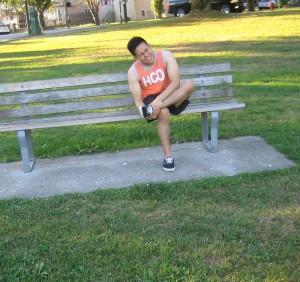Muscle twitching, also called muscle fasciculation, is the fine movement of a small area of muscle that is usually benign unless persistent and chronic.

Muscle twitching is the fine movement of a small area of muscle that often occurs in the eyelids, thumbs, or calves. It is usually not to be an object for concern unless it is persistent and chronic. Unless muscle twitching is characterized by those two traits, muscle twitching should not be worried over. Muscle twitches are often minor and often overlooked. They are a frequent occurrence and can be considered normal despite its annoyance to the person experiencing it. Although in some cases, it can be a sign for an underlying nervous system disorder. Benign twitches usually disappear within a few days. Muscle twitching is not generally considered a medical emergency, however, it can be associated with serious underlying conditions if it is accompanied by other symptoms. Muscle twitching is also called muscle fasciculation.
Causes of Muscle Twitching
Muscle twitching is caused by minor muscle contractions in the specific location, or irrepressible twitching of a group of muscles that is controlled by a single motor nerve fibre. Some of the possible causes of muscle twitching are the following:
- Benign twitches (not caused by a body disease or disorder) can be triggered by:
- Stress and anxiety
- Exercise
- Smoking
- Other common causes:
- Eyelid or eye surface irritation
- Nutrient deficiency in the body
- Side effect of certain drugs, such as diuretics, corticosteroids, or oestrogens
- Overdose of drugs, such as caffeine, amphetamines, and other stimulants
- Autoimmune disorders, such as Isaac Syndrome
- Nervous system conditions:
- Muscular dystrophy
- Myopathy (muscle weakness)
- Spinal muscular atrophy
- Nerve trauma or damage to a particular nerve that leads to a muscle\
- Lou Gehrig’s disease (rare cause)
Accompanying Symptoms of Muscle Twitching
Muscle twitching is not a diagnosis or a disease on its own, instead it is a symptom of an underlying nervous system, when it is accompanied by the following symptoms:
- Persistent and chronic muscle twitching
- Change in or loss of sensation
- Loss of muscle size (wasting / weakness)
Treatment and Prevention of Muscle Twitching
There is typically no medication prescribed or other home remedies necessary to manage muscle twitching. Symptoms usually go away on their own within a few days. However, there are several recommendations that may help avoid muscle twitching. Some tips to avoid muscle twitching include:
- Eating a healthy, well-balanced diet that include all the necessary nutrients the body needs.
- Stop smoking or using products with tobacco.
- Getting enough sleep every night.
- Finding a way to manage stress and anxiety. There are many relaxation techniques available, such as, yoga, and meditation, among others.
- Limit caffeine intake
Disclaimer: This article does not provide medical advice and treatment. The information given should not be used for self-diagnosis of possible conditions. Seek medical attention when necessary. It is important to recognise symptoms of potentially serious conditions at all times to avoid complications from developing. To learn more about to how to prevent symptoms, such as muscle twitching, enrol in first aid and CPR classes with a Canadian or American approved training provider.
Sources:
http://www.healthline.com/health/muscle-twitching?toptoctest=expand
http://www.nlm.nih.gov/medlineplus/ency/article/003296.htm
